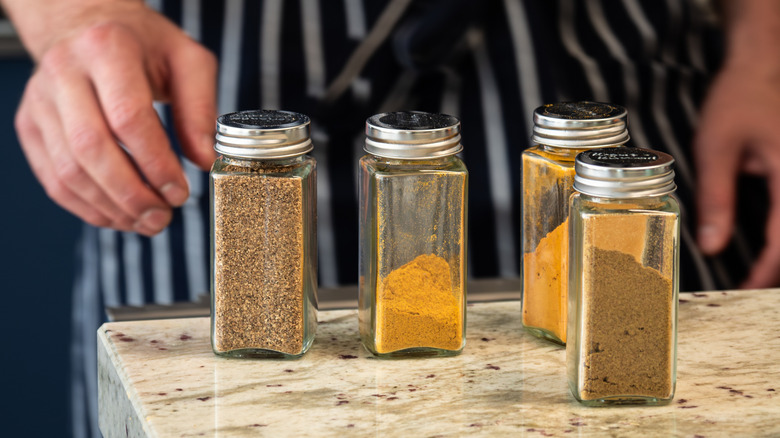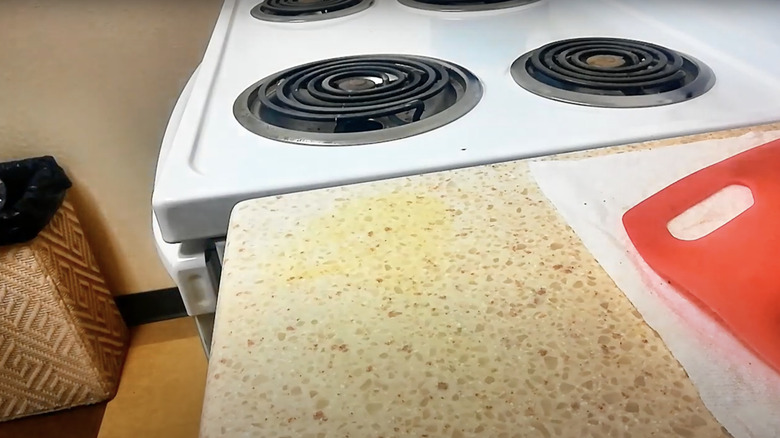Will Turmeric Stain Your Countertops? What To Know Before A Problem Arises
We may receive a commission on purchases made from links.
Whether turmeric is a fan-favorite spice to get rid of ants naturally or you use it in your cooking, you're likely tired of dealing with the yellow stains the spice leaves on everything, including your kitchen countertop, when you work with it. How bad the stain is and how difficult it is to remove depends on how quickly you treat that stain, what you treat it with, and what material your worktop is made of. Porcelain countertops resist turmeric stains the best, though a proactive approach — that is, wiping up any turmeric splashes immediately after they fall on your worktop — is really the only true defense against this yellow-hued menace. If you don't manage to achieve that, you still might be able to tackle turmeric with a homemade or store-bought cleaner designed for oily stains.
A compound called curcumin is responsible for the vibrant yellow hue of turmeric (Curcuma longa), a tropical herb in the Zingiberaceae (or ginger) family. The roots of the plant contain about 3% of the stuff. The powder, wet or dry, is also slightly oily; the microscopic particles cling to the surfaces they end up on and don't easily dissolve in water. (Instead, it's soluble in alcohol.) In fact, the root vegetable stains things so effectively that it's being proposed as an eco-friendly dye for natural and synthetic textiles, gel proteins and other medical research applications, and testing the stain resistance of dental resins, among many other uses. Note, though, that without a setting agent (or mordant, as it's known in the world of dyeing), curcumin yellow will fade over time.
Avoid turmeric stains all together with the right worktop material and quick clean up
One solution to this conundrum is to choose a countertop color that gives your kitchen the right vibe and hides stains — dark-hued granite, for example. Are you set on a white or light-colored kitchen worktop? Invest in stain-resistant materials like porcelain and sintered stone. Conversely, quartz, marble, dolomite, and synthetic materials like laminate hold a stain. Quartzite falls somewhere in between. Another solution is to wipe up splashes of wet turmeric or puffs of turmeric powder the second they hit your countertop, giving the stain no time to set. While this method works, it's not always practical or possible in a busy kitchen.
As you can see, the best way to remove yellow turmeric stains from kitchen countertops depends on the worktop material. For most surfaces, leave a paste of equal parts baking soda and water on the stain for 10, 15, or 20 minutes. Rub the paste into the stain, swirling the cloth, before wiping it off. Fold the cloth into ever-smaller squares as you wipe to avoid spreading the turmeric around. Baking soda might scratch natural stone, however, so test it on a discreet area of your countertop first. Likewise, avoid using lemon and vinegar on marble and granite. A Magic Eraser and a bit of elbow grease may get rid of turmeric stains on epoxy or quartz countertops. Get a 20-pack of SmilinFit Magic Sponge Erasers for about $12. Try hydrogen peroxide and dish soap on laminate countertops. Alternatively, if you have a sunny kitchen, you could let the stain just fade away. Curcumin quickly deteriorates when exposed to UV radiation.

